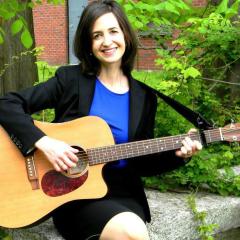
Religious freedom and Chanukah: "Not by might, not by power, but by my spirit"
The memories of Chanukah in my childhood occur to me in snapshots: Playing dreidel on the hardwood floor of our entry-way. The gold foil wrappers of chocolate gelt scattered throughout the house. My parents’ imposing, black iron menorah complete with irremovable wax from years past. My most vivid memory, though, is that of my father sitting at the piano playing Chanukah songs. My three sisters and I would gather around and sing Maoz Tzur while the lights would flicker in the reflection of the picture window of our suburban home. I still strongly associate those memories with Chanukah. (Click to play "Maoz Tzur")
Having three sisters, the sound of the female voice played a significant role in all our holidays and, undoubtedly, is part of the reason why I decided to become a cantor.
This past September, in Israel, nine military cadets of the Israeli Defense Force walked out of an event because a group of women were singing. As you may know, their objection is rooted in the notion of kol isha erva (the voice of a woman is like nakedness. ) These beliefs are certainly not unheard of in some Israeli communities but, disturbingly, these incidents are becoming more common, even in secular neighborhoods.
This last year marked ugly incidents of women wearing tallitot being attacked at the Western Wall. In Orthodox Jewish neighborhoods of Jerusalem, women have not been allowed to walk on the same side of street as men and are required to sit at the back of the bus. In fact, billboards with women have been so frequently vandalized that, for some advertisers, it is no longer cost-effective to use women in their advertisements. Women’s faces and voices in Israel are literally disappearing. (Click to play "Light One Candle")
As Reform Jews, we should be concerned about this and, as a woman, I certainly am. But as a Reform Jewish female cantor, I’m more than simply concerned. I’m angry.
I don’t believe that the female voice should be silenced in Israel in secular life, or in religious life. The stronger the ultra-Orthodox community becomes in Israel, the more influence they exert.
We need to act to support a strong Reform movement presence and voice in Israel. The work of the Israel Religious Action Center is a key part of this. We are coming upon the celebration of Chanukah – a holiday about religious freedom. This must apply to everyone. This Chanukah, we Reform Jews – men and women – will sing words from the prophet Zachariah, “Not by might, not by power, but by my spirit” (adapted by Debbie Friedman) celebrating our victory and our religious freedom. (Click to play "Not by might, not by power")
We must not ignore, or give up on those things that stir us, we must continue to make our voices heard, and we must work for equality between men and women in secular and religious life.

